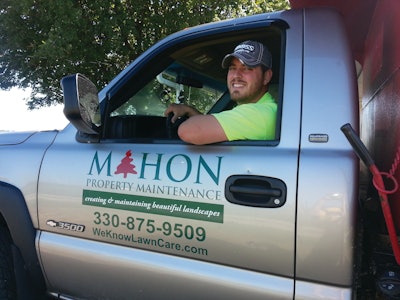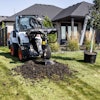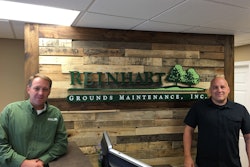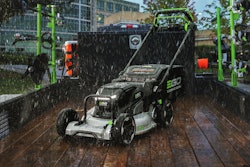
Like many of today's successful contractors, Adam Mahon was working for another landscape company when he saw an opportunity to strike out on his own. Armed with a fundamental understanding of not only how to provide exemplary lawn maintenance services but also how to network and begin building a business on a shoestring budget, Mahon took the leap in 2003, founding Mahon Property Maintenance in Louisville, OH.
Phase 1 – Target your base, build your name
Mahon immediately focused on the commercial market, as his previous employer had also done. "I knew the ins and outs of what to do, who to contact and how it works," Mahon says.
One example of "how it works" has to do with timing. When you should be pitching your services often varies by client type. "We're in Ohio, and many of our commercial customers are making their decisions on lawn maintenance in February or early March," Mahon explains. "But a lot of the HOAs (homeowner associations) make their decisions in July or August. I have no idea why, but they do—and you have to know that. Once I figured that out, I realized I should be ramping up my advertising at that time of the year."
Mahon says he did a lot of research on guerilla marketing, an advertising strategy in which low-cost, unconventional means are utilized. "I'd heard about how a consumer has to see your brand name at least seven times before they'd ever consider buying from you," Mahon says. "So I started thinking about the different ways I could put my brand name in front of my target customers." Here are some things Mahon did during his first few years in business:
- Decaled his trucks and made it a priority to keep them clean and in good condition
- Designed yard signs that would be strategically placed throughout his market area on friends' and clients' properties, and also at key intersections
- Scheduled some targeted classified advertising in certain area papers (depending on markets he wanted to penetrate)
- Scheduled large display ads in phone books
- Built a quality website (mahononline.com). "I was one of the first in my area to have a website right away in 2003," Mahon says. "Having a web presence early on helped tremendously."
Additionally, direct mail become a very important tool. "For the residential side of our business, we used the EDDM (Every Door Direct Mail) program through the U.S. Post Office, targeting specific neighborhoods we wanted to be in," Mahon tells. "We also targeted neighborhoods we were already in but wanted more accounts."
For the HOAs he was interested in servicing, Mahon would handpick four or five individual homes and send them mailings; a personally signed letter from Mahon talking about his company and how he would like the chance to bid on their HOA. The hope was that those individual homeowners would then alert the HOA board about Mahon's request. For the most part, this tactic worked splendidly.
Phase 2 – Finding your focus
A big concern during Mahon's first five years in business was biting off more than he could chew. He continued to guard against that during his next five. "I'm a big believer in under-promising and over-delivering, not the other way around," Mahon says.
It's not that Mahon didn't want to expand and grow. "I just didn't have the capital a lot of guys have," he relates. "I didn’t inherit this company; I started it from scratch with the money I'd saved up pushing shopping carts at Sam's Club during high school." Regardless, Mahon's company did grow. He went from flying solo to employing four or five seasonal employees. Today he employs six during peak season.
Make sure your marketing is working. With respect to marketing, Mahon admits that he pretty much "winged it" during his first five years. His goal was to build name recognition through a variety of cost-effective means. He didn't really have a budget; he just did what he thought was necessary so long as it seemed to be working.
"One thing I have always done is track," Mahon points out. "When new prospects would call in, I always asked them how they heard about us. Most of the time it was a referral, or they saw our direct mail or phone book ad. But over time (2008-present), more and more it's because they found us online."
Thus, Mahon has stopped running expensive phone book advertising. He's reallocated some of those savings into his direct mail programs, which have continued to perform well. "The problem some contractors make is thinking they should send out 10,000 cards all at one time," Mahon says. "I've found that it's better to be really targeted, and then hit those key markets multiple times. So we might target 500 homes, and then send them the same mailer three, four, five times."
For residential, Mahon starts sending the mailers on a weekly basis in early spring. He'll often incorporate some kind of special offer, such as a free mowing with a season-long contract, $50 off a mulch install, or 10% off a landscape renovation, for example. Then, for most commercial, he starts in late-February or early March (as pointed out earlier, the timeframe for HOAs is July-August). The goal here is simply branding; no special offers are involved, generally speaking.
Generating leads online. Mahon has also reallocated some of his phone book-advertising savings into PPC (pay per click advertising) on the major search engines. He's using not only Google, but also Bing and Yahoo. "It's interesting to see how many leads we get through Yahoo," Mahon says. "It seems to still be a really popular search engine among that over-50 crowd." Nonetheless, Google still outperforms Yahoo and Bing combined, Mahon points out.
A big key with PPC advertising, Mahon says, is being very specific in the demographic you are after. "We only target the six or eight service areas (cities) we want to be in," he explains. "We don't want to show up all over the state of Ohio. Our online advertising is extremely targeted. So when I get a lead from Google, Yahoo or Bing, it's a customer who's in a market we're already working in. We try to make our online ad enticing. We incorporate some kind of offer, such as Free Mowing."
Mahon's online PPC ads all click through to his website. He reiterates the importance of a good web presence today, saying, "Especially in lawn maintenance, you have to have a good web presence. You need photos of your work (nicely striped yards, attractive shrubbery, fresh mulch, etc.). Most importantly, you have to be accessible. Most people are doing research online these days. They have to be able to find you and easily get in touch with you."
Qualifying and responding to leads. When a new lead comes in, the first thing Mahon does is look the property up online. He finds it on bing.com/maps to see what kind of service area it is in. Then he heads over to zillow.com to get a feel for the property value.
"As my company has become more established, it's interesting to see how this process has changed," Mahon says. "Now, when a new lead comes in, I scout out that potential client to make sure they are a good fit for us. This is especially important on the residential side. I had some awful experiences when I was younger where renters hired me, and then they'd pack up and move and leave me hanging out to dry."
Many factors go into whether or not a client is a good fit for Mahon Property Maintenance. "I used to have a hard time, like every other contractor, of saying 'no' to new clients," Mahon says. "But I've learned over my 10 years in business that you need systems in your company—and both your employees and customers need to fit those systems. For example, we don't bag grass anymore, except for the fall months. I've also switched from riding mowers to stand-ons because I've found them to be a lot more versatile and productive. I've had a few clients who weren't thrilled about that so, in some instances, we've had to part ways. But most customers were just fine with it."
Phase 3 – Where do you want to go next?
Having been in business for 10 years now, Mahon says he's not nearly as aggressive in seeking out new clients. The consistent brand messaging of his first 10 years is a big reason why; his company has become pretty well-known throughout his area. Nonetheless, Mahon still plans on doing many of the same things that have proven to work in the past, including targeted direct mail, a billboard campaign he started this past spring, and PPC advertising.
But now Mahon is starting to look at how his business as a whole could change. As pointed out earlier, he has recently switched from riding to stand-on mowers, and has stopped bagging grass. He'd sent out a letter to existing customers in advance of these changes being implemented. That letter also alerted customers to the new e-billing system Mahon was transitioning to.
"The (e-billing) program is through QuickBooks," Mahon tells. "We email customers a link to their invoice. There's a 'pay now' button on the electronic invoice, which we also include on our website and Facebook page. I'm trying to streamline the payment thing as much as possible so the whole 'check is in the mail' thing is out the window. Our customers can now pay online by having funds taken out of a checking account or by using a credit card. So it's easier for the customer, and it has really helped my cash flow."
Service offering is also on Mahon's mind as he considers the next steps in his company's evolution. In June of this year, he added light residential excavating/grading services to his offering. What prompted him to make this move? "Last year's drought," he says. "We needed to find something new we could do.
"If it doesn't snow or rain, we don't make any money," Mahon continues. "I just got sick of the up and down roller coaster of maintenance. I mean, maintenance is great because it's recurring income. But last year (2012), when nothing was growing and we had three months where we didn’t cut anything, what are you going to do? Especially when you consider how every Tom, Dick and Harry is out there cutting grass these days, you have to find something you can do that's different."
Light residential excavating was a logical choice for Mahon. When he was starting up his company 10 years ago, Mahon helped out a friend and fellow contractor with his excavating business. So he already knew the basics of this craft. Mahon was also confident that excavating wouldn't be a "commodity" service. "Most people aren't going to hire someone out of the phone book to re-grade their yard or put a catch basin in," he points out.
Mahon had finally tucked enough money away to buy a brand new skid-steer loader. He bought one, a Caterpillar, this past June. "They had some really good deals going on, and I just couldn't pass it up," Mahon relates. "The timing just seemed right."
The extension into excavating has been rather stressful thus far. "We already have our existing maintenance business going," Mahon says, referring to his two mow crews and one landscaping crew. "Getting all of the permits, trailer and other ducks in a row to get this excavating business going has been insane. But you have to do what you have to do."





















